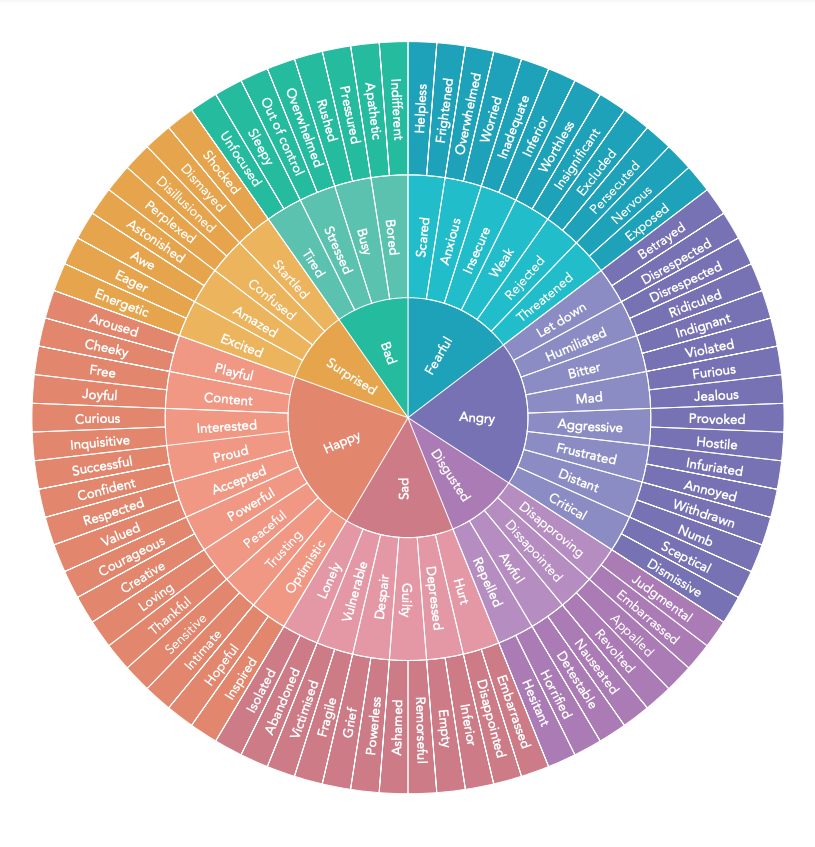Your Cart is Empty
Free shipping on Orders $79+
Free shipping on Orders $79+
Explore

How to Deal With Those Uncomfortable Feelings
May 04, 2022 5 min read
How are you really feeling?
Mental health is at the forefront of everyone’s minds lately not just because it’s Mental Health Awareness Month, but because it’s something that has broken all our hearts at some point in our lives. Whether we encounter mental health issues personally or within our relationships, family and friends, this is an issue that affects us all on a very deep level. I’ve come to believe that if our mental health isn’t right, our entire health system is compromised and nothing can be right.
That’s why I like to do a regular check in to see how my loved ones are really feeling. However, when someone asks me how I’m feeling, I usually default to replying that I’m “fine” no matter what is happening in my life.
There was a time when an overseas friend once asked me why Americans always respond with “fine” no matter what was going on in our lives. We could be battling significant health problems, we could be breaking up with our significant other, be depressed at our job, or our kids could be on drugs.. but the answer is always “fine.”
That “fine” characterization haunted me for years and I didn’t know how to respond to her until I started my own journey with therapy for the very first time.
I’ve learned that it is very important to try to put words to our emotions in order to care for our mental health.
If we don’t take the time to identify how we are really feeling in response to our life events, we begin repressing and silencing our inner voices. This can have extensive consequences if we choose to overlook or numb our feelings over a prolonged period of time.
This is when we begin slipping.
We might choose to stop taking care of ourselves in the ways we used to.
It might start with skipping the gym for a day or three. Forgetting to eat a vegetable all week. Choosing the drive-through over a balanced meal. Staying up all night to doom scroll instead of resting. Overreacting with our loved ones and saying something nasty that we regret later. Beginning a toxic negative self-talk cycle.
When we continually numb ourselves or give into anxiety, it’s much more likely that we will end up choosing an unhealthy behavior.
This is the time to choose self-care and ask yourself, how are you really feeling?
A great way to begin exploring our emotions is using a tool I like to call theFeelings Wheel. I personally have never seen anything like this before so it was a bit overwhelming to see all these words for emotions that seemed foreign to me. The concept that I followed was to begin to acknowledge how I was really feeling in the heat of a moment.
If I am feeling triggered or dysregulated, I try to take the time to identify how I am really feeling, and to possibly trace it back to a time back in my life where a prior incident made me feel the same way.
Just taking the time to acknowledge that I was feeling insignificant, provoked, powerless, or disappointed was a huge step in beginning to acknowledge that I am worth the effort it will take to care for myself.
We all have a variety of triggers that are specific to our unique experiences, but we can all benefit from self soothing practices.
Here are the top three things to do when we are feeling triggered:
- Stay in the present (rather than going into autopilot responses) and pause before you react. One of my favorite sayings is to “strike when the iron is cold.” Try not to react while red hot in your emotions.
- Observe your sensations and start consciously taking deep breaths through them, rather than reacting to those big feelings.
- Release the energy from your body in healthy ways. Try deep breathing, taking a walk, moving your body or allowing yourself to have a deep cry. This will help bring your body back to your baseline and to leave the threatened state.
Here are 10 more ideas for how to calm yourself down when feeling dysregulated:
- Sit in the sun or get some fresh air.
- Put your hand on your heart and on your belly and take deep, methodical breaths. Observe your hands moving up and down. Can you see if you can exhale for 8 seconds or longer?
- Cook a colorfulclean meal and watch your favorite movie afterwards. If you’re too stressed to cook, make ahealthy, calming smoothie. Remember to enrich your body with nourishing nutrients during a time of need.
- Call your most positive friend and have a heartfelt conversation.
- Allow yourself to feel your emotions fully. Crying releases comforting chemicals that eases physical and emotional pain and boosts your immune system.
- Stream a workout and move your body to release the tension.
- Sing 80s ballads in the shower. Okay, it doesn't have to be 80s ballads or even in the shower, but believe it or not, singing does a lot to calm your nervous system. I just bumped into a senior citizen that was singing as she walked into the elevator yesterday- she turned to me and sheepishly said, “I just can’t get that song out of my head.” Not a single person in the elevator didn’t smile at that. Be like her.
- Put your phone on “do not disturb” and walk outside for as long as it takes. Call a friend or sing while walking. See point 7 about singing.
- Take out your journal, your phone, or a piece of paper and do a brain dump- write down everything that is on your mind and don’t stop until you have nothing left to write down.
- Say this out loud. I am safe. I am loved. I’m enough.
Instead of giving into feelings when overwhelmed, remind yourself how strong you are. Tell yourself, “I am strong, I can cope with this.” You’ve gone through other difficult situations. We can do hard things.
Mental health is a critical part of our overall health. When we don’t feel right, nothing can be right in our lives. I hope these tips can help remind you of how capable you are and how much you can cope with. Being in touch with our feelings and learning how to self-soothe is one of the very first steps to our mental well-being. Taking care of yourself means watching for our mental health as well as our physical health. We care about both.
For more SMART lifestyle tips like this, visit our other blogs at www.smartpressedjuice.com and follow us on Instagram or like us on Facebook. You can also visit our shop to stock up on our delicious juices.
{"themeColor":"#574CD5","iconColor":"#574CD5","showLogo":true,"topBottomPosition":10,"rightLeftPosition":10,"iconSize":"small","iconCustomSize":64,"position":"bottom-left"}

